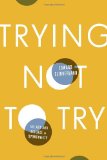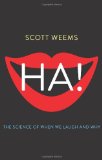
The Rise: Creativity, the Gift of Failure, and the Search for Mastery by Sarah Lewis (Simon & Schuster, 2014)
(kindle ed.), (amazon.co.uk), (UK kindle ed.)
Book description from the publisher:
It is one of the enduring enigmas of the human experience: many of our most iconic, creative endeavors—from Nobel Prize–winning discoveries to entrepreneurial inventions and works in the arts—are not achievements but conversions, corrections after failed attempts.
The gift of failure is a riddle. Like the number zero, it will always be both a void and the start of infinite possibility. The Rise—a soulful celebration of the determination and courage of the human spirit—makes the case that many of our greatest triumphs come from understanding the importance of this mystery.
This exquisite biography of an idea is about the improbable foundations of creative human endeavor. The Rise begins with narratives about figures past and present who range from writers to entrepreneurs; Frederick Douglass, Samuel F. B. Morse, and J. K. Rowling, for example, feature alongside choreographer Paul Taylor, Nobel Prize–winning physicists Andre Geim and Konstantin Novoselov, Arctic explorer Ben Saunders, and psychology professor Angela Duckworth.
The Rise explores the inestimable value of often ignored ideas—the power of surrender for fortitude, the criticality of play for innovation, the propulsion of the near win on the road to mastery, and the importance of grit and creative practice. From an uncommonly insightful writer, The Rise is a true masterwork.
Google Books preview:
See also: Author’s website
Comments (0)
- new books
March 4, 2014

Trying Not to Try: The Ancient Chinese Art and Modern Science of Spontaneity by Edward Slingerland (Crown, 2014)
(kindle ed.), (amazon.co.uk), (UK kindle ed.)
Book description from the publisher:
A deeply original exploration of the power of spontaneity—an ancient Chinese ideal that cognitive scientists are only now beginning to understand—and why it is so essential to our well-being
Why is it always hard to fall asleep the night before an important meeting? Or be charming and relaxed on a first date? What is it about a politician who seems wooden or a comedian whose jokes fall flat or an athlete who chokes? In all of these cases, striving seems to backfire.
In Trying Not To Try, Edward Slingerland explains why we find spontaneity so elusive, and shows how early Chinese thought points the way to happier, more authentic lives. We’ve long been told that the way to achieve our goals is through careful reasoning and conscious effort. But recent research suggests that many aspects of a satisfying life, like happiness and spontaneity, are best pursued indirectly. The early Chinese philosophers knew this, and they wrote extensively about an effortless way of being in the world, which they called wu-wei (ooo-way). They believed it was the source of all success in life, and they developed various strategies for getting it and hanging on to it.
With clarity and wit, Slingerland introduces us to these thinkers and the marvelous characters in their texts, from the butcher whose blade glides effortlessly through an ox to the wood carver who sees his sculpture simply emerge from a solid block. Slingerland uncovers a direct line from wu-wei to the Force in Star Wars, explains why wu-wei is more powerful than flow, and tells us what it all means for getting a date. He also shows how new research reveals what’s happening in the brain when we’re in a state of wu-wei—why it makes us happy and effective and trustworthy, and how it might have even made civilization possible.
Through stories of mythical creatures and drunken cart riders, jazz musicians and Japanese motorcycle gangs, Slingerland effortlessly blends Eastern thought and cutting-edge science to show us how we can live more fulfilling lives. Trying Not To Try is mind-expanding and deeply pleasurable, the perfect antidote to our striving modern culture.
Google Books preview:
See also: Book on Facebook
Comments (0)
- cognitive science,happiness,new books
March 2, 2014

Ha!: The Science of When We Laugh and Why by Scott Weems (Basic Books, 2014)
(kindle ed.), (amazon.co.uk), (UK kindle ed.),
Book description from the publisher:
Humor, like pornography, is famously difficult to define. We know it when we see it, but is there a way to figure out what we really find funny—and why?
In this fascinating investigation into the science of humor and laughter, cognitive neuroscientist Scott Weems uncovers what’s happening in our heads when we giggle, guffaw, or double over with laughter. While we typically think of humor in terms of jokes or comic timing, in Ha! Weems proposes a provocative new model. Humor arises from inner conflict in the brain, he argues, and is part of a larger desire to comprehend a complex world. Showing that the delight that comes with “getting” a punchline is closely related to the joy that accompanies the insight to solve a difficult problem, Weems explores why surprise is such an important element in humor, why computers are terrible at recognizing what’s funny, and why it takes so long for a tragedy to become acceptable comedic fodder. From the role of insult jokes to the benefit of laughing for our immune system, Ha! reveals why humor is so idiosyncratic, and why how-to books alone will never help us become funnier people.
Packed with the latest research, illuminating anecdotes, and even a few jokes, Ha! lifts the curtain on this most human of qualities. From the origins of humor in our brains to its life on the standup comedy circuit, this book offers a delightful tour of why humor is so important to our daily lives.
Google Books preview:
See also: Author’s website
Comments (0)
- cognitive science,new books





